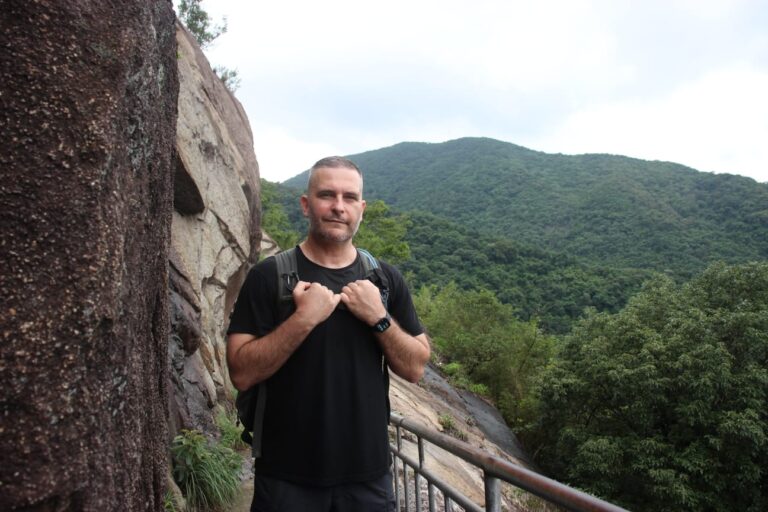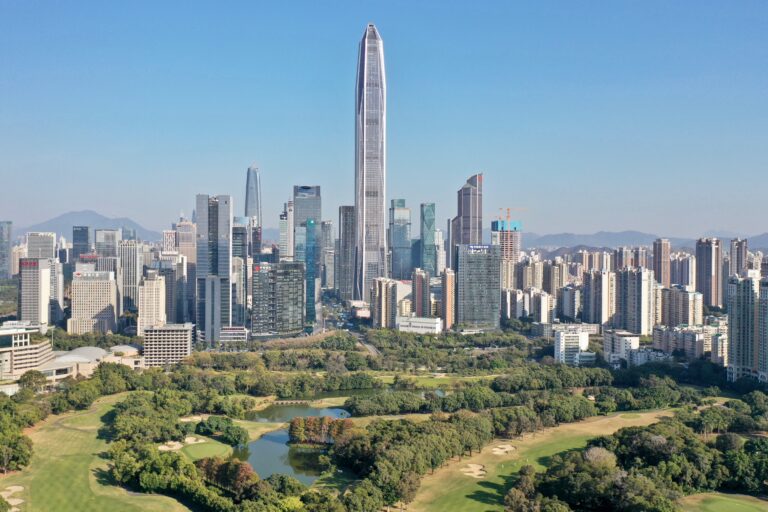
Galilei Circle of Friends – Interview with Mauro Rubin

Mauro Rubin is VP and Overseas business director at AIXC Holding (Shenzhen), where he serves as Director of AI Research and Innovation. He developed his first program in “basic language” when he was eleven years old, discovering the passion that would have stayed with him for the rest of his life. From 1998 to 2001 he taught skydiving in the Italian Army and he approached for the first time to the VR simulator for paratroopers.
In December 2010, he founded JoinPad, one of the most advanced Augmented Reality companies in the industrial sector. In 2011, it presented the world’s first wearable AR solution for the maintenance field. In 2017, JoinPad was awarded the prestigious AWE Award (a world reference event for AR).
From 2017 to 2019, he chaired the Italian presidency of VRARA (Virtual Reality & Augmented Reality Association), the largest world association in the sector.
Now he works as CEO in JoinPad, CEO at CoAI (Shenzhen company), and VP and Overseas business director at AIXC Holding (Shenzhen).

PART 1- INTRODUCTORY PART – Personal Relationship with China
How did your experience with China begin? Was it a chance encounter, related to your work, or for pleasure?
One day, my dear friend Massimo proposed to me the opportunity to work on a project at Beijing Jiaotong University as a visiting professor. I had never worked as a teacher before, but I had similar experiences at various Italian universities, including the Polytechnic University of Milan. In 2016, China was an unknown country to me, known only through books, so I didn’t let this opportunity slip away. Once I arrived, the “cultural shock” didn’t discourage me; on the contrary, it motivated me to learn more about Chinese culture. It’s an experience I recommend to everyone: stepping out of your comfort zone and adapting to a new environment.
How has your relationship with China evolved over time?
After the first week, I began using each day to meet new people, especially in the technology sector. I grew up with a great passion for cyberpunk culture, and Beijing, with its skyscrapers and temples adorned with bright neon lights, made me live a dream. Everywhere I turned, I found a mix of technology, traditions, and residential areas filled with smells, smoke, food, and many people. Over time, I learned about the Chinese technology market, discovering interesting opportunities. So, in 2017, I decided to open a branch of my group in Xi’an, focusing on artificial intelligence and augmented reality. Since then, my relationship with China has become increasingly important, to the point that in 2022, I decided to move to Shenzhen.
What has your personal experience in this splendid country taught you?
There are countless lessons learned from living in a cultural context different from the one you were born into. Learning is not always easy; it obliges us to change our reference points, questioning many preconceived notions that we often aren’t even aware of. I have learned to manage international relationships and often act as a cultural mediator between my European and Chinese partners. I discovered that we Italians have much in common with Chinese culture: we love food, spending time at the table with friends, and getting to know our business partners well before starting ventures together. I learned the importance of the word “Guanxi,” which refers to the tight circle of connections that each person has. It’s not just about your LinkedIn network; it’s something deeper. If someone offers you their Guanxi in China, they are opening the doors to something very personal. These are just some of the lessons… the list could be very long.

PART 2 – Business
How has China changed compared to your early years in terms of business in your specific industry? What are the differences that have struck you the most positively and negatively?
Since 2016, China has undergone significant changes, and it would be appropriate to consider not only the temporal but also the spatial context to evaluate these changes. There are regions that have experienced remarkable development, such as Ningbo, Tianjin, Nanjing, just to name a few, thanks to government investments. The economies of these areas have become extremely competitive in various sectors. Not to mention the major economic centers that have continued to grow, such as Beijing, Shanghai, Shenzhen, and the entire Guangdong region.
Speaking of the specific industry I work in, artificial intelligence and augmented reality, China has made giant leaps. There are hundreds of companies focused on smart glasses for augmented and virtual reality (in Europe, we probably only know of Nreal and Pico), but some of these companies will soon become famous for their innovative and low-cost products, thanks to the advantages of local production. The field of artificial intelligence is closely linked to hardware and microchip production. The services used in daily life demonstrate a great capacity for technological adaptation by local governments, businesses, and citizens. On the other hand, the software sector has struggled to develop significantly compared to the hardware sector, which is culturally more connected to factory production lines.
In general, the openness towards foreigners is influenced by geopolitical developments. Due to the COVID-19 pandemic, China has closed itself off in a sort of bubble for three years, but recently there has been a renewed dialogue with Europe. The Chinese people, in general, are very welcoming and always ready to seize business opportunities.
Can you tell us about your work experience with China? What was your role, and what are the main results you have achieved over the years?
I have been dedicated to augmented reality and artificial intelligence for 14 years, working in Europe, the United States, and China, and developing companies in all these geographical areas. In the past, I founded a company in China that, despite winning the prestigious Augmented Reality World award as the best Asian company in the augmented reality sector in 2017, did not succeed for various reasons. We had the wrong partner, we were ahead of the market too soon, and, last but not least, our software product failed to meet local needs (unlike in the United States and Europe).
Since 2022, I have held the position of Vice President of International Operations and Director of AI Research and Innovation at AIXC, a company active in the semiconductor and artificial intelligence industry. Our products (chips) optimize energy processes in various sectors, including automotive and power plants, but we also operate in the field of medical components and intelligent cameras for robots and drones.
How important is it to know the local culture and language in your business?
Language is definitely important. I started studying it seriously only after moving to Shenzhen. It takes years to master it, and although I still have a long way to go, it is important to know at least some phrases to use when speaking publicly or introducing oneself. The Chinese greatly appreciate these efforts because they demonstrate that you are making an effort to understand their culture.
Furthermore, there are a series of behaviors that are learned over time, like unwritten rules. For example, drinking tea together during business meetings and tasting baijiu (a liquor that can reach up to 65 degrees) during lunches and dinners. A person who refuses these initial experiences will hardly be considered for doing business.
Regarding your current company, what projects are you focusing on and what are the future goals?
AIXC is an international group composed of Europeans, Chinese, and Koreans, specializing in the development of next-generation microchips with artificial intelligence. Currently, our group includes about 10 companies operating in various sectors. Our future investments will focus on creating production lines and developing increasingly innovative products.
How important is the role of technology in your business? From this perspective, is it an advantage to operate in China for your company?
Technology is an integral part of our daily routine, and working in China allows us to have direct contact with production lines, stay updated on the latest technologies, and have a fast execution capability. Additionally, it offers us the opportunity to quickly obtain capital to support our projects.

PART 3 – GOING EAST – Why does it still make sense for an Italian company to be in China?
Why does it still make sense to target the Chinese market for an Italian company, and what are the specific opportunities in the region where you operate?
The Chinese market offers a massive scale compared to the Italian market in any industry. The large number of potential customers, combined with highly efficient production capacity and a well-developed logistics chain, favors all types of distribution. Additionally, Chinese consumers have a strong affinity for Italian products in various market sectors. Consequently, the question I often pose to Italian entrepreneurs is, “Why not seize these opportunities?”
In the region where we operate, there are additional advantages. Our company benefits from advanced technological infrastructure and well-established industrial clusters in the region, which provide access to qualified suppliers and opportunities for collaboration with highly competent local partners. Furthermore, the local government’s support for foreign investment creates a favorable environment for the company’s development and growth.
Targeting the Chinese market offers tremendous potential and numerous growth opportunities for an Italian company, both in general and specifically in the region where we operate.
Are you already present in Chongqing or in the Chengdu-Chongqing economic circle?
Not yet, but we have ongoing negotiations.
How can Galilei and Sant’Anna in Chongqing potentially be helpful to your company in China and Italy?
Absolutely. In terms of research and development of new products, we are always looking for bright minds to conduct research in various fields or establish group startups.
Interview by Marco Bonaglia



